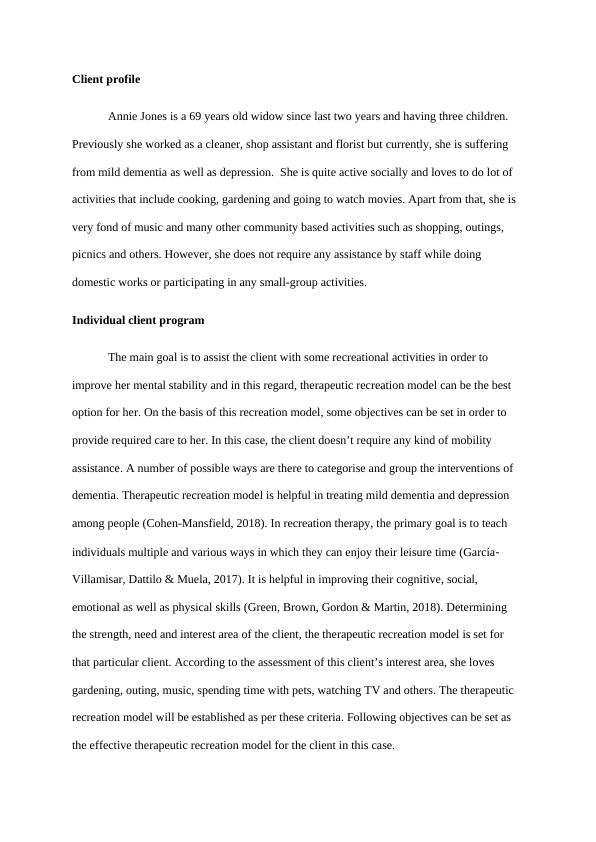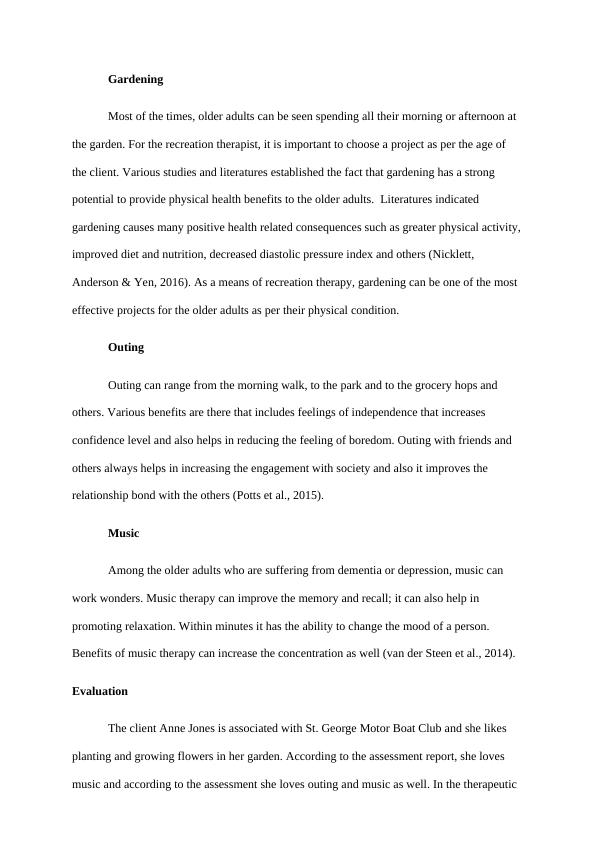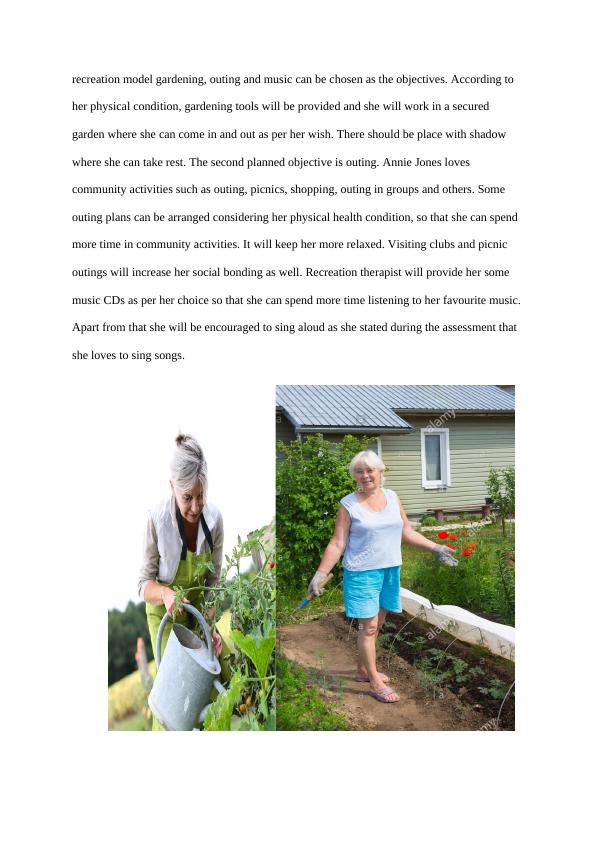Therapeutic Recreation Model for Dementia and Depression
Added on 2023-04-21
8 Pages1276 Words405 Views
Client profile
Annie Jones is a 69 years old widow since last two years and having three children.
Previously she worked as a cleaner, shop assistant and florist but currently, she is suffering
from mild dementia as well as depression. She is quite active socially and loves to do lot of
activities that include cooking, gardening and going to watch movies. Apart from that, she is
very fond of music and many other community based activities such as shopping, outings,
picnics and others. However, she does not require any assistance by staff while doing
domestic works or participating in any small-group activities.
Individual client program
The main goal is to assist the client with some recreational activities in order to
improve her mental stability and in this regard, therapeutic recreation model can be the best
option for her. On the basis of this recreation model, some objectives can be set in order to
provide required care to her. In this case, the client doesn’t require any kind of mobility
assistance. A number of possible ways are there to categorise and group the interventions of
dementia. Therapeutic recreation model is helpful in treating mild dementia and depression
among people (Cohen-Mansfield, 2018). In recreation therapy, the primary goal is to teach
individuals multiple and various ways in which they can enjoy their leisure time (García‐
Villamisar, Dattilo & Muela, 2017). It is helpful in improving their cognitive, social,
emotional as well as physical skills (Green, Brown, Gordon & Martin, 2018). Determining
the strength, need and interest area of the client, the therapeutic recreation model is set for
that particular client. According to the assessment of this client’s interest area, she loves
gardening, outing, music, spending time with pets, watching TV and others. The therapeutic
recreation model will be established as per these criteria. Following objectives can be set as
the effective therapeutic recreation model for the client in this case.
Annie Jones is a 69 years old widow since last two years and having three children.
Previously she worked as a cleaner, shop assistant and florist but currently, she is suffering
from mild dementia as well as depression. She is quite active socially and loves to do lot of
activities that include cooking, gardening and going to watch movies. Apart from that, she is
very fond of music and many other community based activities such as shopping, outings,
picnics and others. However, she does not require any assistance by staff while doing
domestic works or participating in any small-group activities.
Individual client program
The main goal is to assist the client with some recreational activities in order to
improve her mental stability and in this regard, therapeutic recreation model can be the best
option for her. On the basis of this recreation model, some objectives can be set in order to
provide required care to her. In this case, the client doesn’t require any kind of mobility
assistance. A number of possible ways are there to categorise and group the interventions of
dementia. Therapeutic recreation model is helpful in treating mild dementia and depression
among people (Cohen-Mansfield, 2018). In recreation therapy, the primary goal is to teach
individuals multiple and various ways in which they can enjoy their leisure time (García‐
Villamisar, Dattilo & Muela, 2017). It is helpful in improving their cognitive, social,
emotional as well as physical skills (Green, Brown, Gordon & Martin, 2018). Determining
the strength, need and interest area of the client, the therapeutic recreation model is set for
that particular client. According to the assessment of this client’s interest area, she loves
gardening, outing, music, spending time with pets, watching TV and others. The therapeutic
recreation model will be established as per these criteria. Following objectives can be set as
the effective therapeutic recreation model for the client in this case.

Gardening
Most of the times, older adults can be seen spending all their morning or afternoon at
the garden. For the recreation therapist, it is important to choose a project as per the age of
the client. Various studies and literatures established the fact that gardening has a strong
potential to provide physical health benefits to the older adults. Literatures indicated
gardening causes many positive health related consequences such as greater physical activity,
improved diet and nutrition, decreased diastolic pressure index and others (Nicklett,
Anderson & Yen, 2016). As a means of recreation therapy, gardening can be one of the most
effective projects for the older adults as per their physical condition.
Outing
Outing can range from the morning walk, to the park and to the grocery hops and
others. Various benefits are there that includes feelings of independence that increases
confidence level and also helps in reducing the feeling of boredom. Outing with friends and
others always helps in increasing the engagement with society and also it improves the
relationship bond with the others (Potts et al., 2015).
Music
Among the older adults who are suffering from dementia or depression, music can
work wonders. Music therapy can improve the memory and recall; it can also help in
promoting relaxation. Within minutes it has the ability to change the mood of a person.
Benefits of music therapy can increase the concentration as well (van der Steen et al., 2014).
Evaluation
The client Anne Jones is associated with St. George Motor Boat Club and she likes
planting and growing flowers in her garden. According to the assessment report, she loves
music and according to the assessment she loves outing and music as well. In the therapeutic
Most of the times, older adults can be seen spending all their morning or afternoon at
the garden. For the recreation therapist, it is important to choose a project as per the age of
the client. Various studies and literatures established the fact that gardening has a strong
potential to provide physical health benefits to the older adults. Literatures indicated
gardening causes many positive health related consequences such as greater physical activity,
improved diet and nutrition, decreased diastolic pressure index and others (Nicklett,
Anderson & Yen, 2016). As a means of recreation therapy, gardening can be one of the most
effective projects for the older adults as per their physical condition.
Outing
Outing can range from the morning walk, to the park and to the grocery hops and
others. Various benefits are there that includes feelings of independence that increases
confidence level and also helps in reducing the feeling of boredom. Outing with friends and
others always helps in increasing the engagement with society and also it improves the
relationship bond with the others (Potts et al., 2015).
Music
Among the older adults who are suffering from dementia or depression, music can
work wonders. Music therapy can improve the memory and recall; it can also help in
promoting relaxation. Within minutes it has the ability to change the mood of a person.
Benefits of music therapy can increase the concentration as well (van der Steen et al., 2014).
Evaluation
The client Anne Jones is associated with St. George Motor Boat Club and she likes
planting and growing flowers in her garden. According to the assessment report, she loves
music and according to the assessment she loves outing and music as well. In the therapeutic

recreation model gardening, outing and music can be chosen as the objectives. According to
her physical condition, gardening tools will be provided and she will work in a secured
garden where she can come in and out as per her wish. There should be place with shadow
where she can take rest. The second planned objective is outing. Annie Jones loves
community activities such as outing, picnics, shopping, outing in groups and others. Some
outing plans can be arranged considering her physical health condition, so that she can spend
more time in community activities. It will keep her more relaxed. Visiting clubs and picnic
outings will increase her social bonding as well. Recreation therapist will provide her some
music CDs as per her choice so that she can spend more time listening to her favourite music.
Apart from that she will be encouraged to sing aloud as she stated during the assessment that
she loves to sing songs.
her physical condition, gardening tools will be provided and she will work in a secured
garden where she can come in and out as per her wish. There should be place with shadow
where she can take rest. The second planned objective is outing. Annie Jones loves
community activities such as outing, picnics, shopping, outing in groups and others. Some
outing plans can be arranged considering her physical health condition, so that she can spend
more time in community activities. It will keep her more relaxed. Visiting clubs and picnic
outings will increase her social bonding as well. Recreation therapist will provide her some
music CDs as per her choice so that she can spend more time listening to her favourite music.
Apart from that she will be encouraged to sing aloud as she stated during the assessment that
she loves to sing songs.

End of preview
Want to access all the pages? Upload your documents or become a member.
Related Documents
Therapeutic Recreation: Divisional Therapy Assessment Reportlg...
|5
|1033
|146
Recreational Therapy for Adult Clients at Myrtle Cottage Ingleburnlg...
|13
|3278
|65
Efficacy of Occupational Therapy for Dementia in Older Adultslg...
|20
|5817
|52
Diversional Therapy: Improving Health and Well-being through Holistic Carelg...
|13
|3386
|3
Behavioural Health Risk Factors Assignmentlg...
|9
|2226
|11
Healthcare Assignment: Therapeutic Approachlg...
|10
|2895
|43